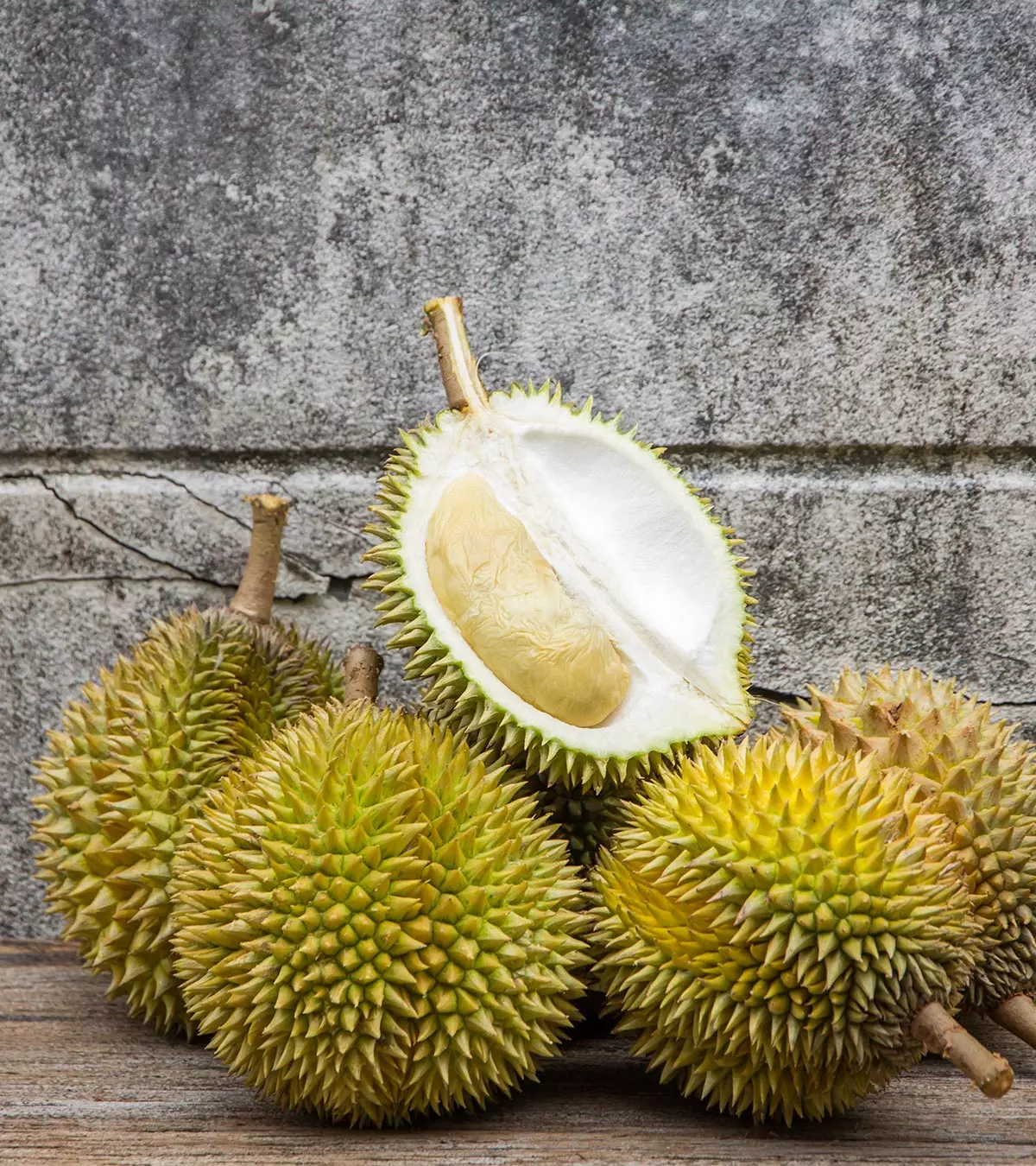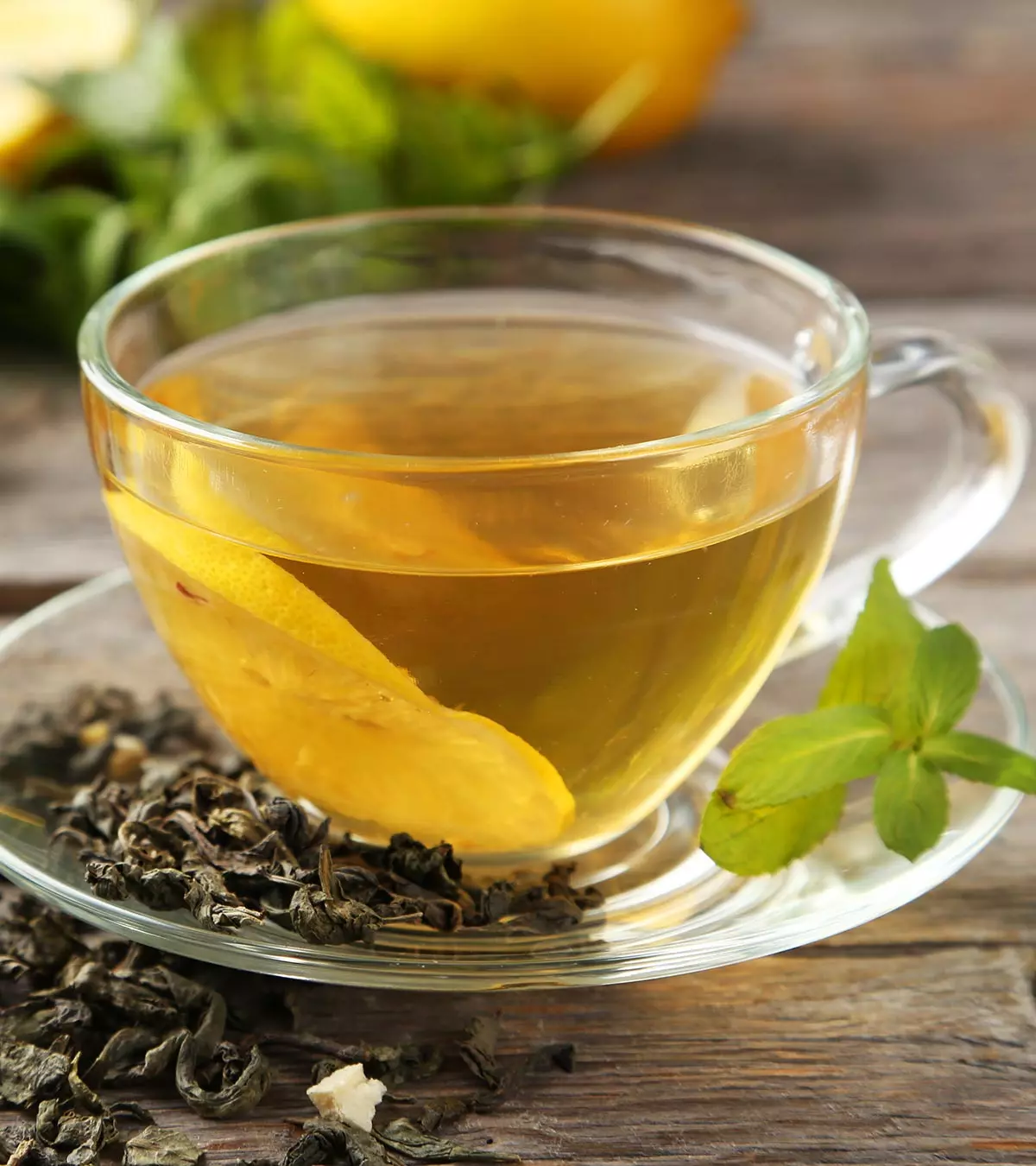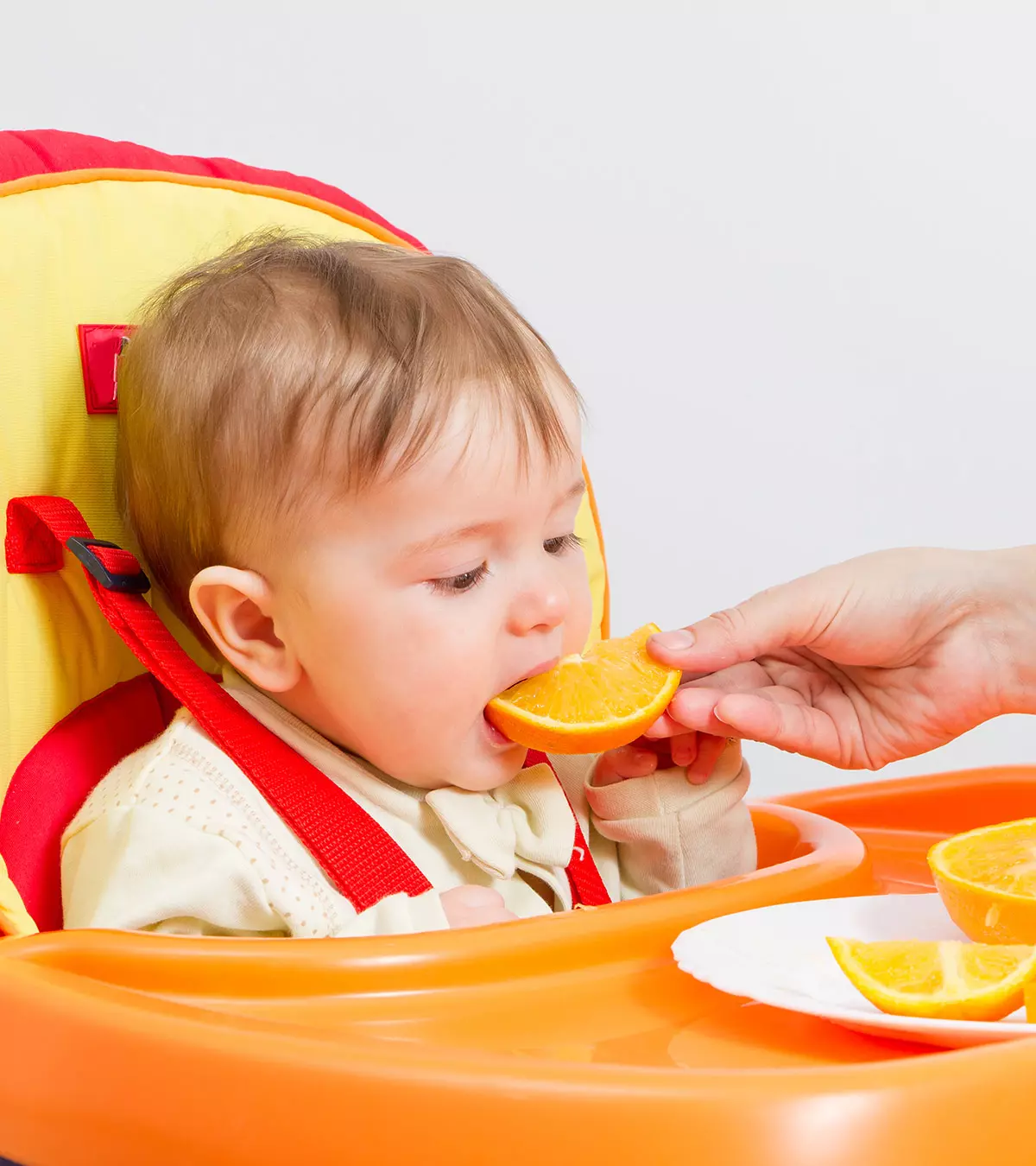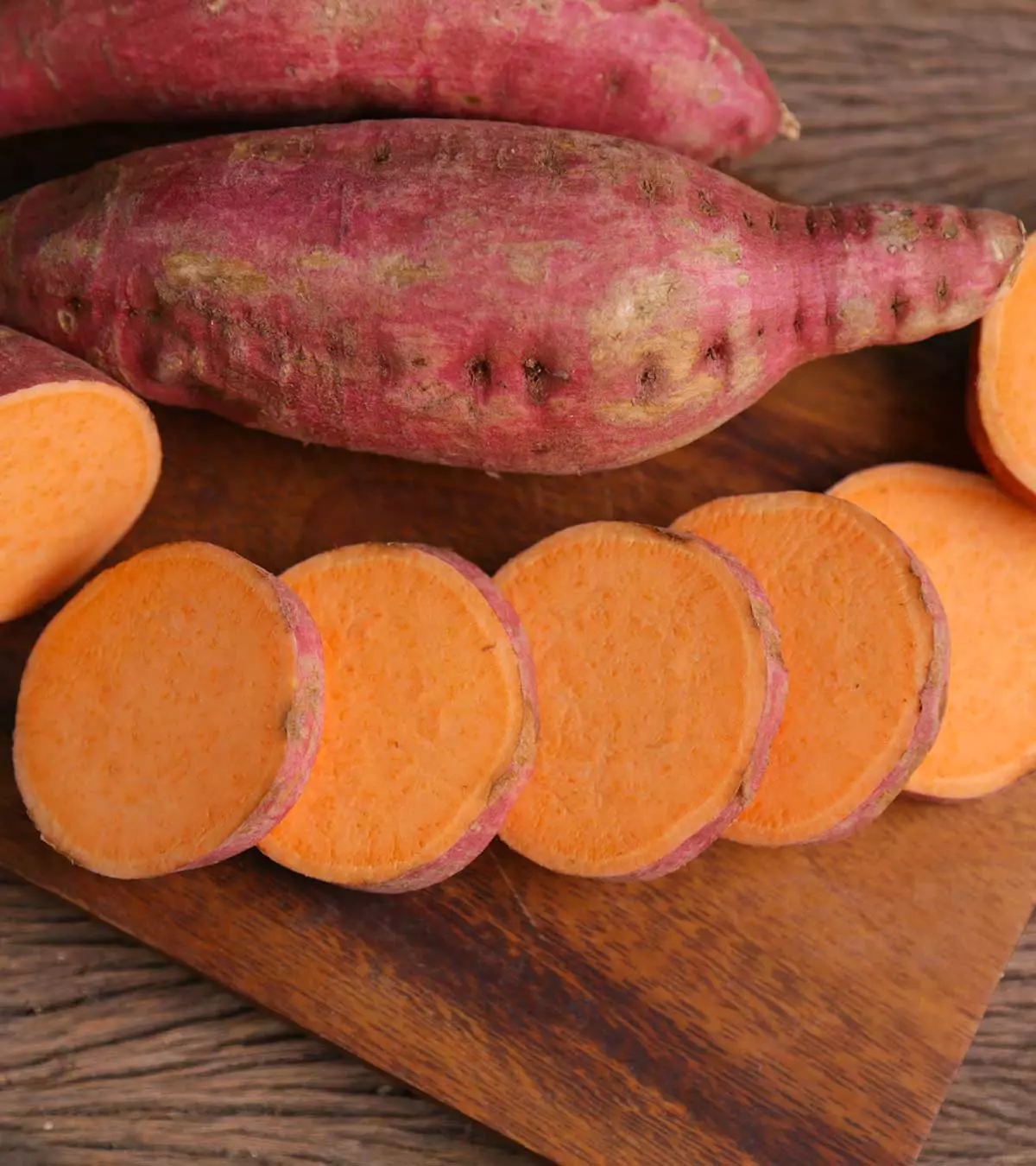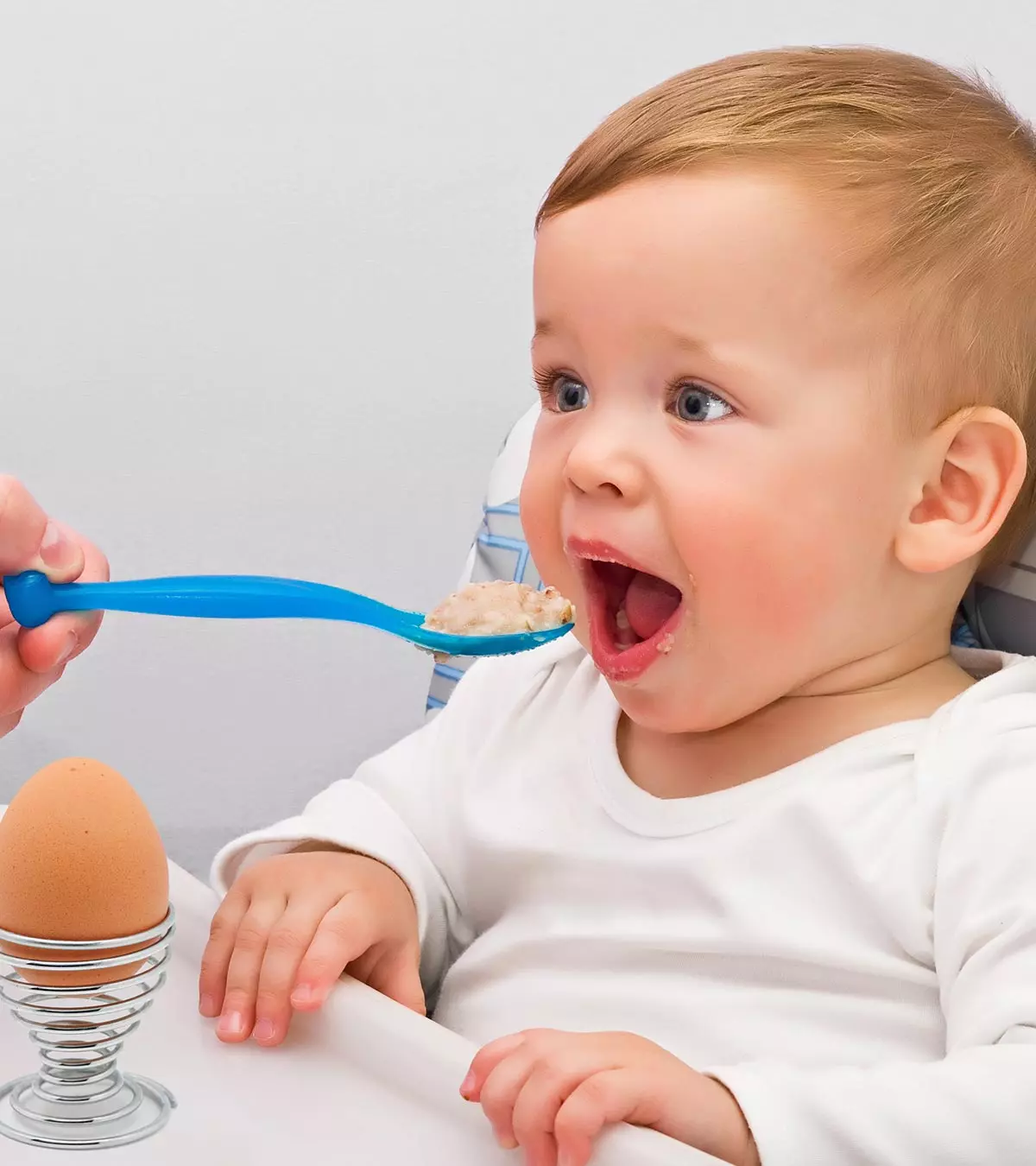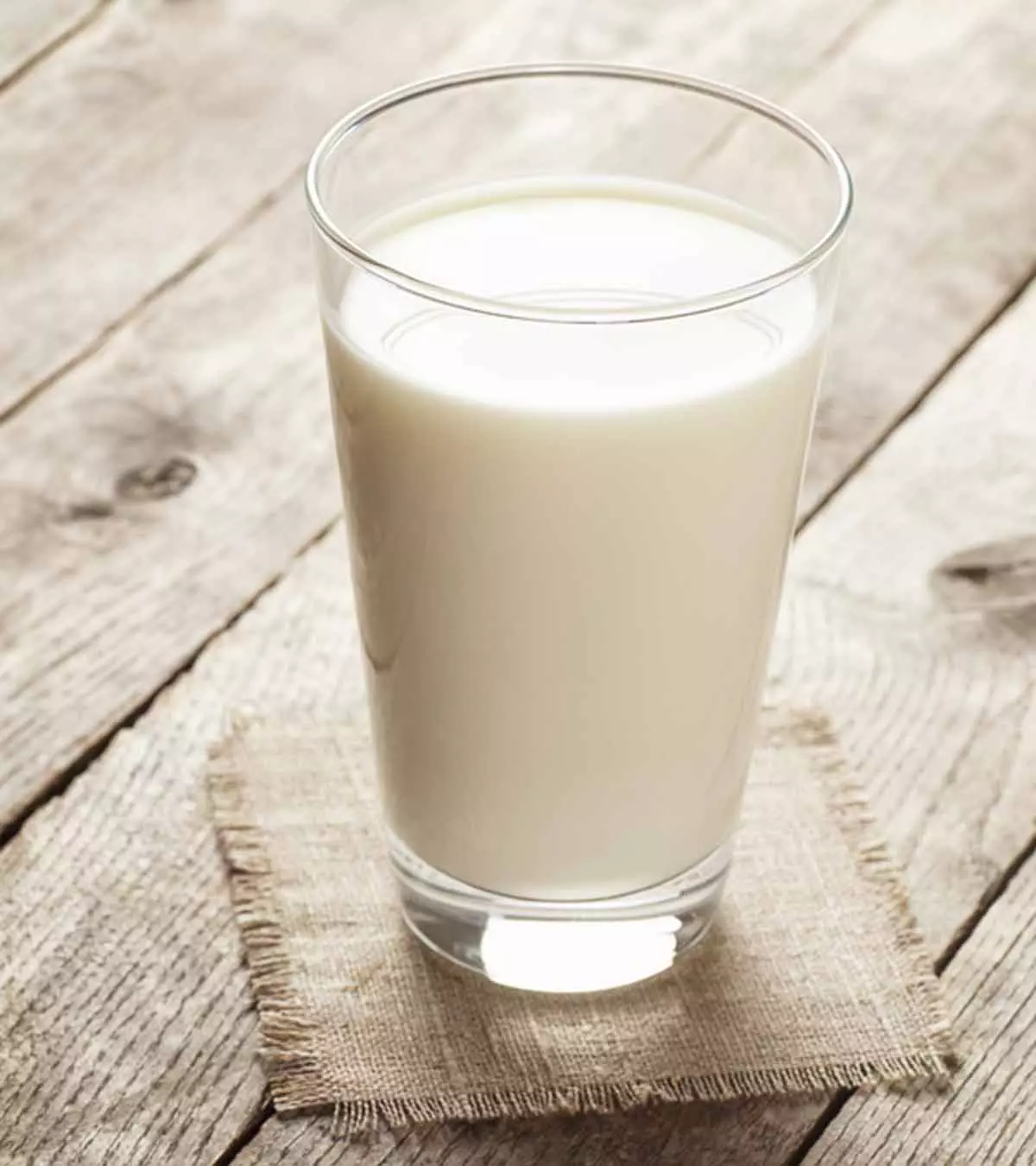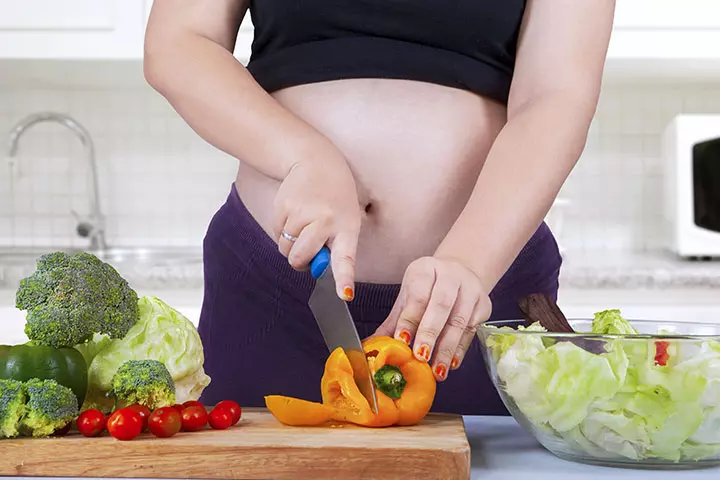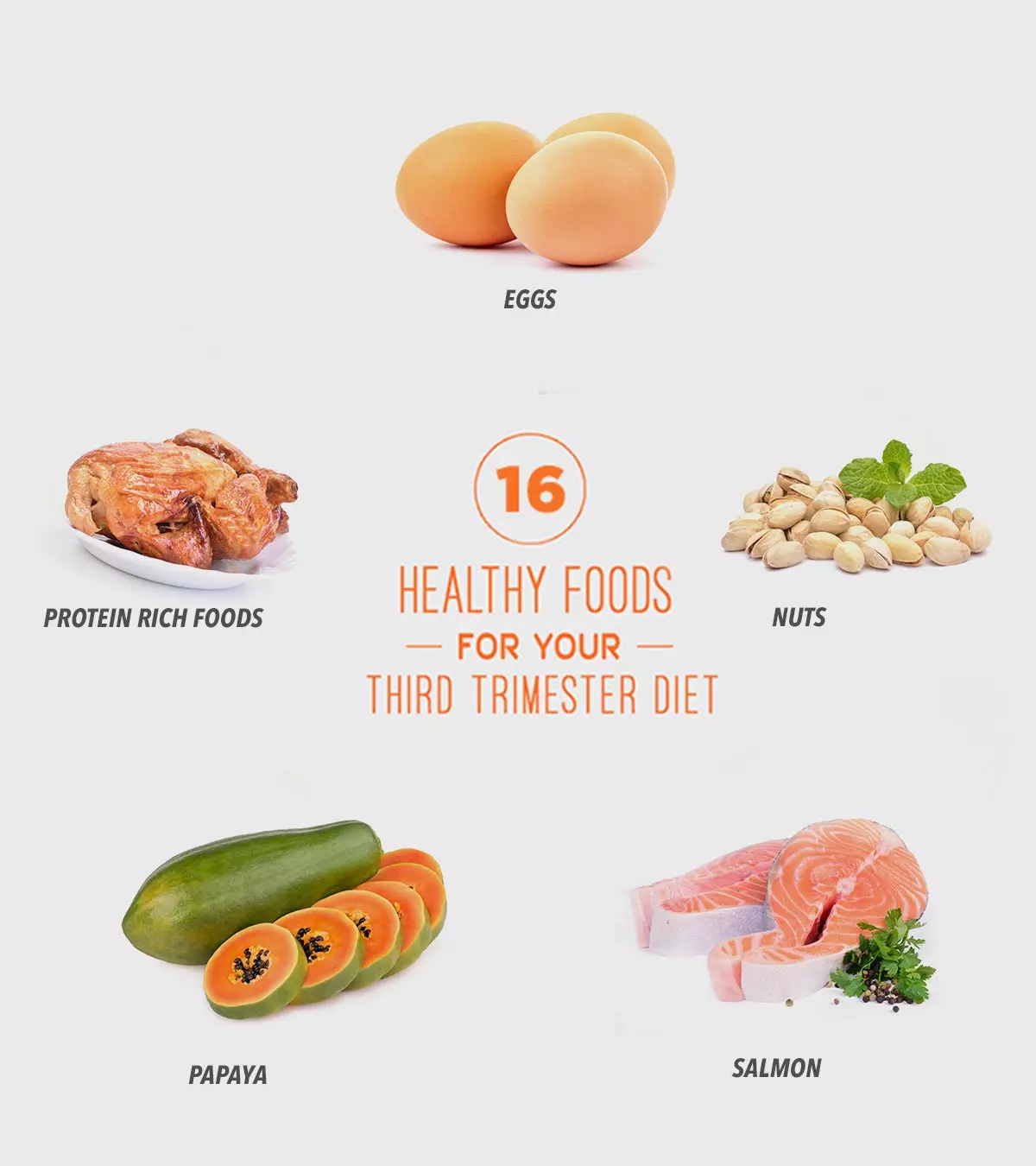
Image: Shutterstock
The third trimester of pregnancy extends from the 28th week until childbirth. It is important to meet the recommended nutritional requirements in the third trimester to have sufficient energy to keep up with your daily routine while providing all necessary nutrients to your growing child. Previously, pregnant women were advised to eat for two, where the focus was primarily on the quantity rather than the balance of required nutrients. The present recommendations emphasize that what you eat is more important than how much you eat, especially in advanced pregnancy. Continue reading this post, where we discuss your nutritional requirements in the third trimester of pregnancy and suggest foods that you may include in your pregnancy diet.
Key Pointers
- Increasing caloric intake during the third trimester is essential.
- Pregnant women must include vital nutrients in their diet, such as iron, Vitamin C, vitamin D, calcium, and others.
- Whole grains, fruits, and vegetables are essential for the health and development of both the mother and child.
- Adequate fluid intake should be ensured to prevent dehydration.
Nutritional Requirements In The Third Trimester
Compared to non-pregnant women of the same age, pregnant women have higher nutritional needs. However, the nutritional requirements also vary with the advancement of each pregnancy trimester for the fetus’ healthy growth and development, with the third trimester having the highest nutritional demands overall.
The graph below represents the proportion of folic acid, calcium/vitamin D, iron, vitamins, and other dietary supplements required in each trimester based on a study conducted on 903 pregnant women. As shown in the graph, while pregnant women may need almost similar proportions of folic acid and vitamin D/calcium throughout the pregnancy, the requirements of iron, vitamins, and other dietary supplements significantly increase for the third trimester.

Nutritional requirements during the three trimesters
Source: Nutrient supplementation among pregnant women in China: an observational study; Cambridge University Press; The Nutrition SocietyDuring the trimester, you need an additional 450 calories a day to your basic caloric and protein needs (1). Read these dietary guidelines to know the proper amount of nutrients you need in your pregnancy diet for a healthy weight gain:
- DHA is important for proper development of the fetal brain and retina during the third trimester. Its requirement increases from 100 to 200mg per day.
- You need a daily dose of 1,000mg calcium, which is essential to build bones and teeth in your baby. Milk and other dairy products, such as cheese and yogurt, are the best sources of calcium.
- Vitamin D is needed for the bones to absorb calcium. You would need 15 µg per day.
- During pregnancy, most pregnant women will need around 175-210 gms of carbohydrates per day.
- With the progressing pregnancy, the iron requirement for fetal growth rises in proportion to the weight of the fetus, with most of the iron accumulating during the third trimester (2). You would need 27mg of it every day.
According to Lisa Richards, a nutritionist and the creator of the Candida Diet, “The primary supplement you should take is a prenatal vitamin with folic acid and fish oil. This will ensure proper brain and spinal cord development of the baby.” - Folic acid is essential to avoid neural defectsiSevere congenital abnormality (birth defect) of the spine and brain of the baby. in the baby. The most common types are spina bifida and anencephaly, affecting approximately 1,300 and 700 babies annually in the US, respectively, as per the US Centers for Disease Control and Prevention (US CDC) (21). Your intake can go up to 800µg per day.
- You need additional 26g a day of protein in the third trimester as it is required to maintain maternal tissues and fetal growth.
Amber, a dietician and third-time mother, shares about her protein intake during pregnancy. She says, “One thing I do focus on… is always always always pairing a protein + carb. Carbohydrates are our body’s number one fuel source for energy, so it gets used up really quickly (mostly by our brain) and we end up feeling hungry sooner than we should. Eat an apple by itself and I’m hungry in a half hour. Add in some nut butter or cheese and that snack carries me over much further to my next meal time. Why? Protein slows digestion and keeps that food fueling your body rather than the quick intake of glucose (carbohydrate) acts on its own (i).” - If you have gestational diabetes, you must consult your gynecologist or a nutritionist for a proper diet plan. You might have to consume foods with low glycemic index.
Now that you know the nutritional requirements in the third trimester, let’s explore a well-balanced diet plan.
 Did you know?
Did you know?Third Trimester Diet Chart
| Magnesium rich foods | Dark green leafy vegetables, nuts, whole grains, avocados |
| Protein rich foods | Eggs, milk, yogurt, tofu, all meats |
| Calcium rich foods | Broccoli, watercress, cheese, seafood, dried peas, and beans |
| Folic acid rich foods | Lentils, beans, Brussels sprouts, oranges, eggs |
| Iron rich foods | Breads and pastas, beans, beets, raspberries, strawberries, red meat, dry fruits like apricots, prunes |
Foods You Should Have During The Third Trimester
Here is a list of the best foods to eat in the third trimester:
1. Fruits
Shena Jaramillo, a registered dietitian from Yakima County, Washington, says, “Common nutritional issues in the third trimester include iron deficiency and low fiber intake.” Fresh fruits are rich in vitamin C and play a vital role in the development and proper functioning of the placenta. The vitamin absorbs iron from the food and helps in maintaining a strong immune system (3).In your third trimester, you must take fresh fruits such as kiwis, strawberries, banana, and melon (4). If you are working, then pack the fruit slices for your snacks and eat them during breaks.
2. Lentils
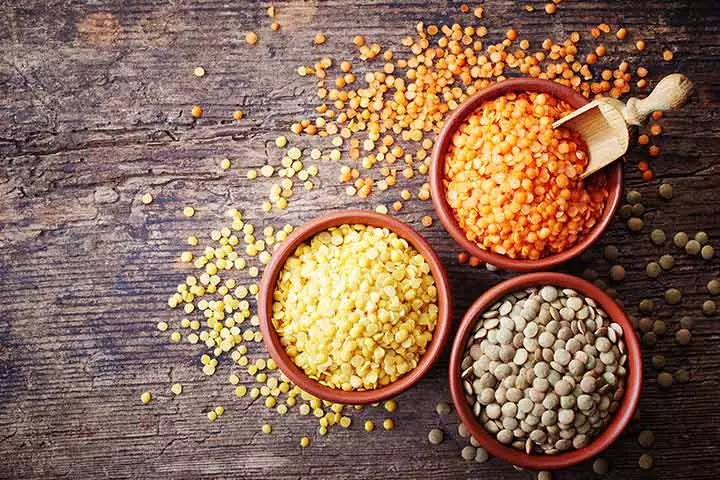
Legumes, including lentils and beans, are rich in thiamine (vitamin B1), folate (iron), and fiber (5). You can make soup, porridge (dal), or stew with cooked lentils and beans and have them in your meals.
3. Ham and vegetable salad
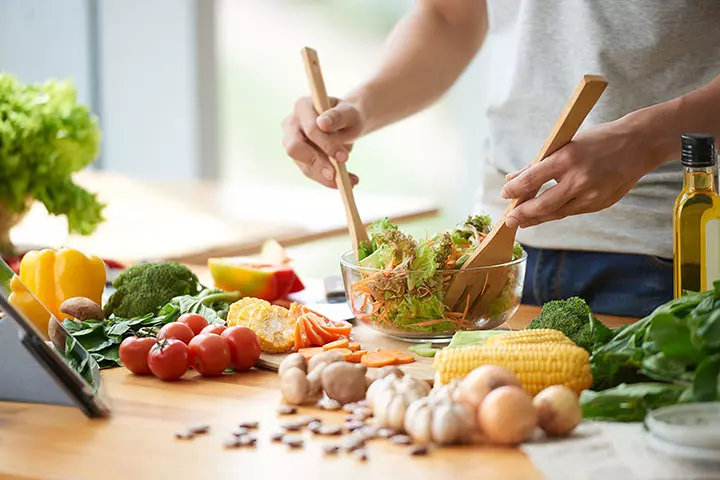
Vegetables are a rich source of vitamins and ham is a thiamine booster that helps release energy from the food. A salad of radishes, tomatoes, lettuce, and sweet corn, along with thin slices of ham, is an excellent inclusion in your diet during the third trimester.
4. Seeds and nuts
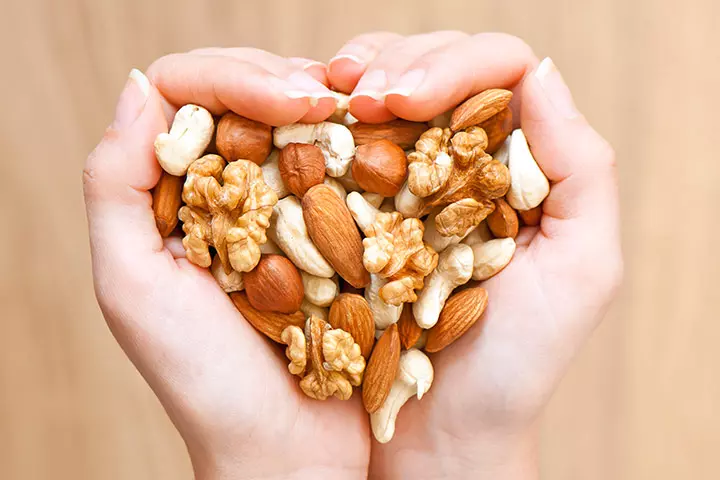
Munching on seeds and nuts will provide you with sufficient amounts of thiamine, essential omega-3 fatty acids, and proteins (6). You can snack on sunflower seeds and dry fruits such as hazelnuts, almonds, and walnuts added to your breakfast cereals and cereal bars.
5. Wholemeal toast with baked beans
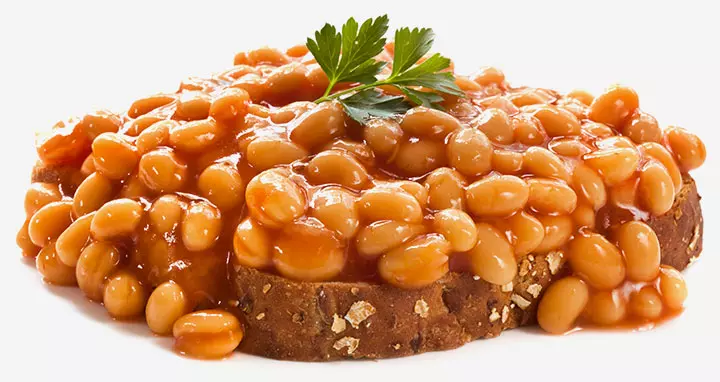
Wholemeal toast with baked beans is rich in thiamine and fiber that help keep up your energy level throughout the day and prevent constipation.
6. Bacon sandwich
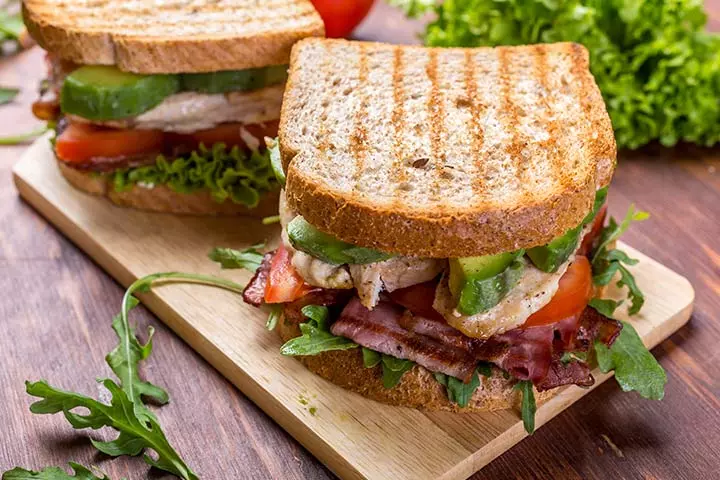
It is a power pack of thiamine and vitamin C. Make a sandwich with thinly sliced and grilled lean bacon, sliced tomatoes and fresh granary bread, and you will simply love the taste.
7. Avocado salad
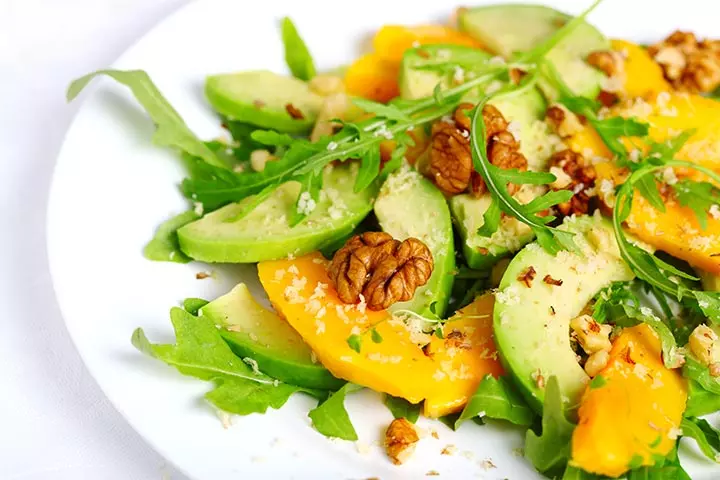
Avocado is rich in vitamin C, E, and fiber (7). Mix avocado slices with walnuts, watercressiA perennial plant and one of the oldest leaf vegetables that humans can consume. , and fruits like mango or orange and add flavorings of your choice.
8. Brussels sprouts
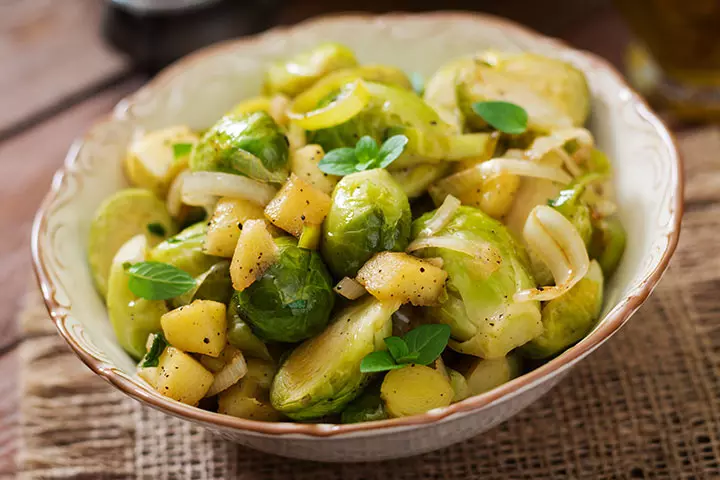
They are rich in vitamin C and K and make a good side-dish for your meals (8). It can either be steamed or microwaved until cooked or stir fried with spring onions, garlic, and ginger.
9. Salmon
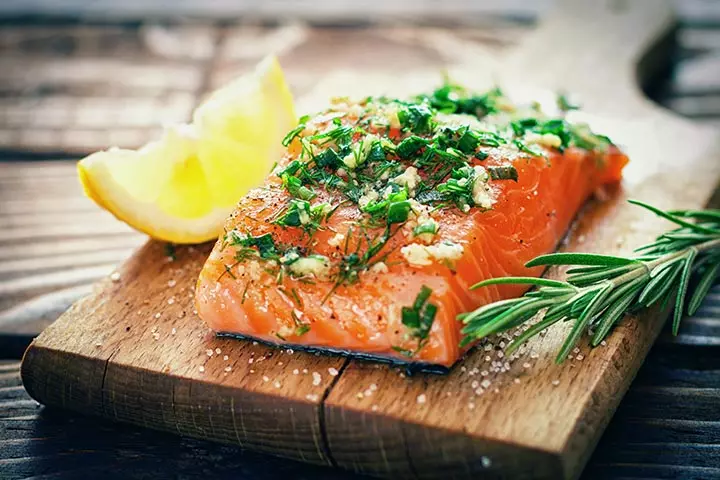
The third trimester is associated with the brain development of your baby. Salmon fish is a good source of omega-3 fatty acids and DHA, which is important for the development of your baby’s nervous system(18). However, you can have salmon in limited quantities and only if it is properly cooked. Go for home-made salmon.
10. Eggs
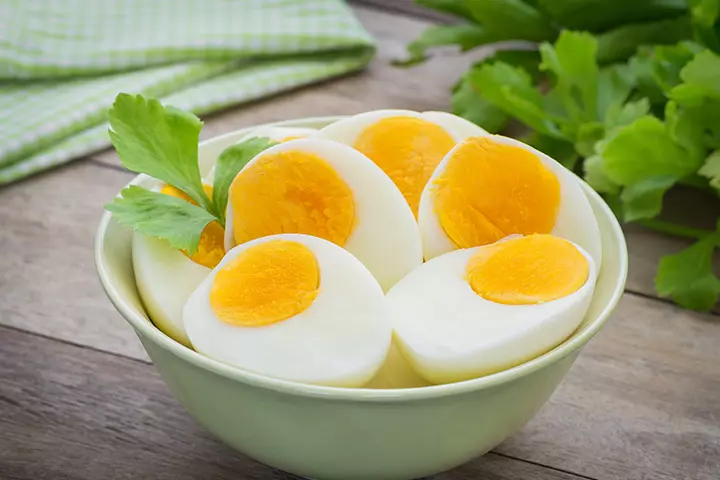
Eggs are a good source of choline, which helps in proper functioning of cells and in the rapid development of the baby(19). Choline aids in memory development and reduces the risk of renal and pancreatic disorders. You can have a thoroughly boiled egg in your breakfast.
 Quick fact
Quick fact12. Ripened papaya
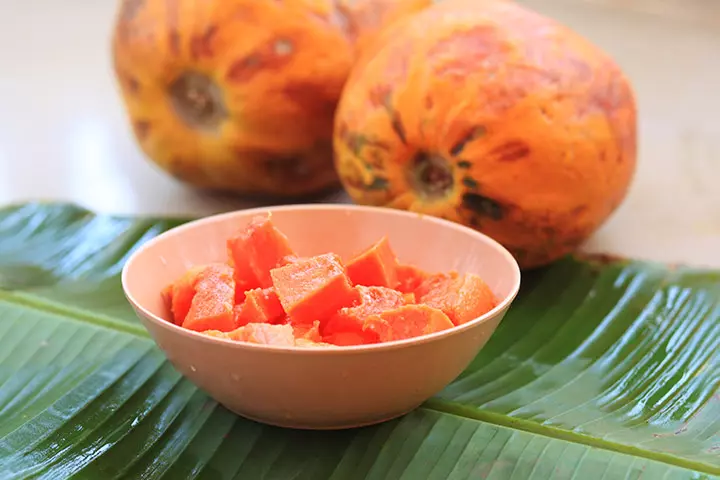
It is a good source of vitamin C, fiber, potassium, and folate (9). It also helps in preventing heartburns that are common during the third trimester. However, do not eat unripe papaya because it contains pepsiniAn enzyme present in the stomach that helps in the digestion of protein found in ingested food. , which can induce contractions and early labor.
13. Green smoothies
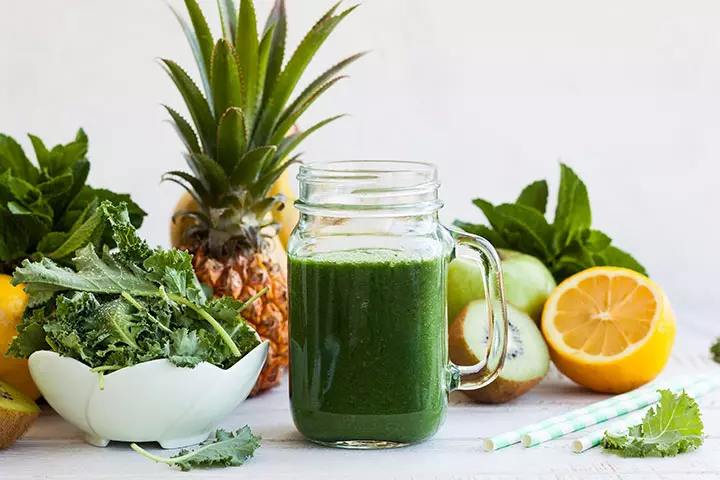
Green smoothies are a rich source of fiber, calcium, vitamin B6, magnesium, and potassium (10). A blend of baby spinach or kale with ice makes an excellent green smoothie. You can use coconut water and add other ingredients like berries, pineapple, orange, mango, mint or ginger to enhance the taste of the smoothie.
14. Milk and milk products
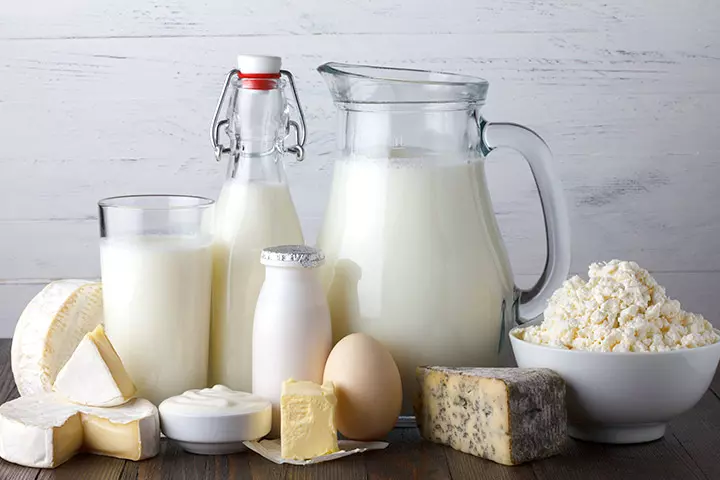
These are rich sources of calcium. By the third trimester, your calcium requirement increases (11). Calcium rich foods during pregnancy help ensure you and your baby meet your calcium needs. Milk and milk products along with calcium supplements as prescribed by the doctor will help you meet the requirement.
15. Iron-rich foods
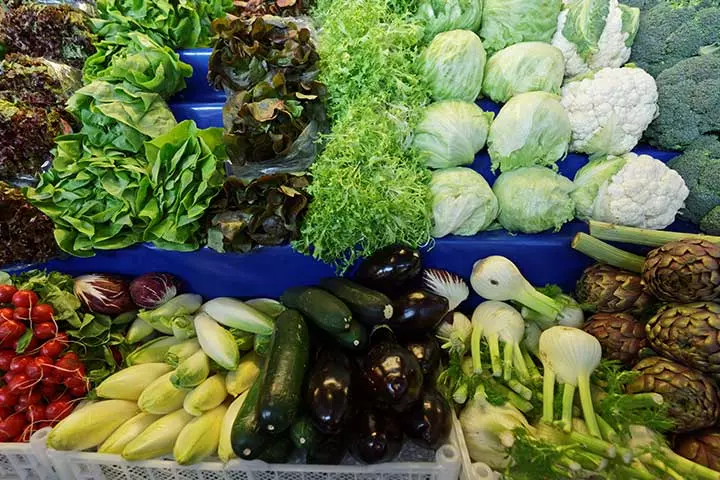
Green leafy vegetables, broccoli, lean beef, and pork are rich in iron. Iron is necessary for the increased supply of blood to the placenta during the third trimester (12).
A fitness instructor and mother of two, Molly Mills, shares how green leafy veggies helped her consume enough iron during the third trimester. She says, “Kale sauteed in butter, topped with salt, and a hefty squeeze of lemon juice has been a staple this pregnancy. Leafy greens also happen to be high in iron, which helped my anemia, too, in conjunction with upping my prenatal vitamin to twice a day (ii).”
 Quick tip
Quick tip16. Folic acid-rich diet
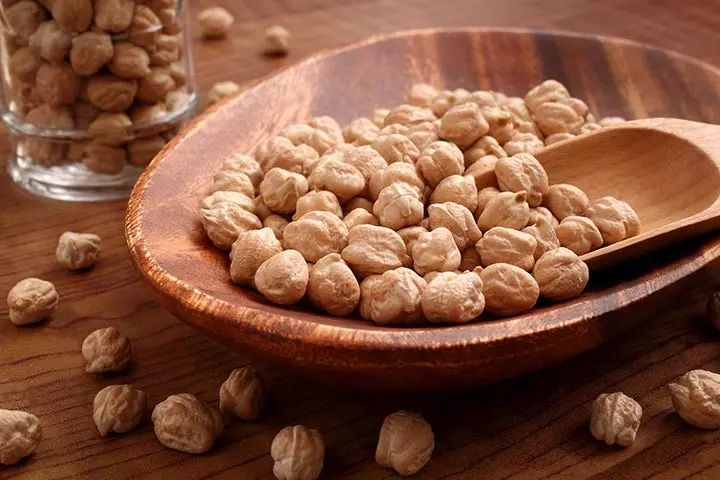
Folic acid prevents neural tube defects in the developing baby (11). Bread, yeast, beans, chickpeas, and green leafy vegetables like spinach are all a good source of folic acid.
Now you know there is a long list of foods that you need to cover during the third trimester. It could be exhausting to remember and eat each food unless you have a plan in place.
Third Trimester Diet Plan
Here is an example of a diet plan. You may follow this or change it to suit your requirements in such a way that you get the required calories and all the essential nutrients.
| Food items | Daily servings |
|---|---|
| For breakfast: | |
| Broccoli parmesan cheese omelet | 1 serving = 407 calories |
| Whole wheat toast with butter 1 slice toast with 1 tsp butter | 1 serving =125 calories |
| Orange juice (100ml) fortified with vitamin C and calcium | 1 serving =42 calories |
| For snacks: | |
| Mango (1 cup) It is rich in protein, vitamin C and folate. | 1 serving = 100 calories |
| Apricots and walnuts Rich in proteins. | Apricot (1/2 cup) = 37calories Walnuts ( 1 cup) = 173 calories |
| For lunch: | |
| Salmon salad sandwich Fill a pita with salmon and green vegetables. It gives you a good shot of sodium and protein. | 1 serving = 422 calories |
| Soy crisps A good source of protein and fiber. | 1 serving = 140 calories |
| Cantaloupe (1/4th of melon) It is rich in vitamins A and C. | 1 serving = 50 calories |
| For snacks: | |
| Vegetables (carrots, broccoli or bell peppers with 2 tablespoons hummus) | 1 cup veggies = 121 calories |
| For dinner: | |
| Sauteed halibut (fish) | 1 serving (204 gm) = 379 calories |
| Wild rice It is rich in protein and fat. | 1 cup = 166 calories |
| For dessert: | |
| Skimmed milk, fortified with calcium. | 8-ounce serving = 80 calories |
The diet plan makes your food goals simple, right? Add a few food tips to it, and you are good to close your pregnancy on a healthy note:
Healthy Diet Tips To Follow During The Third Trimester
Here are a few diet tips that you can follow (13) (16) (20):
- Start the day with a filling breakfast, such as fruit and oats, to ensure you have enough energy throughout the day.
- Manage your portions to accommodate small, frequent meals that keep you comfortably full. Never skip a meal.
- Include all healthy food groups such as whole grains, fruits, vegetables, proteins, dairy, and healthy fats in your daily diet to ensure holistic nutrition.
- Drink lots of fluids to maintain hydration and have smooth bowel movements. Pregnant women are recommended to drink 8-12 glasses of water daily.
Highlighting the importance of sufficient water intake during pregnancy, Amber says, “I have a 20-ounce water bottle that I fill multiple times a day – counted three times between breakfast and lunch and three times during the afternoon. I usually stop drinking after dinner in fear that I’ll be awake way too many times during the night for trips to the potty. I completely relate my relatively heavy water intake to any lack of swelling.”
- Avoid highly processed foods high in salt, sugar, and fat.
- Use iodized salts for cooking but in limited quantities. Consumption of excess salt can lead to water retention and ankle swelling.
- Cut down on sodas, fruit drinks, sweetened waters, and energy or sports drinks.
- Opt for pregnancy-safe herbal teas and decaf coffee after consulting with your doctor.
- Take pregnancy supplements such as folic acid, vitamins, and iron as prescribed.
- Quit smoking and eliminate all types of alcohol, including wine and fruit beers, as these may harm the fetus. Drugs and other stimulantsiIn food, stimulants are substances or compounds that increase an individual's feeling of hunger are also not recommended during pregnancy.
According to nurse midwife Tamara Noy, “Fetuses can’t break down alcohol in the way that adults do. Alcohol stays in their systems longer and dangerously interferes with fetal brain and nervous system development (12).”
- Avoid high-mercury fish such as swordfish, shark, white snapper fish, and mackerel.
- Avoid consuming raw or undercooked sprouts, meats, poultry, eggs, fish, and shellfish to reduce the risk of foodborne illnesses such as listeriosisiA serious bacterial infection caused due to consuming food contaminated by Listeria monocytogenes and toxoplasmosisiParasitic infection caused by Toxoplasma gondii parasite .
- Do not consume unpasteurized milk, juices, or cheeses, as these may carry a similar risk for contamination.
- Avoid deli meats, smoked seafood, hot dogs, and meat, seafood, or pre-prepared vegetable salads.
- Avoid spicy, greasy, and fried foods to prevent indigestion and heartburn.
Frequently Asked Questions
1. Why is nutrition important in the third trimester?
Mothers should consume nutritious foods during pregnancy to balance the unborn baby’s nutritional needs while having a healthy nutritional status. During the third trimester, you may need 450 extra calories a day. It should be obtained from healthy foods and snacks to maintain a healthy balanced diet.
You may ask your OB-GYNE for a more individualized plan based on your body weight, activities, and the number of babies (14). Eating empty calories such as sweets or junk food may not have nutrients such as vitamins and minerals required for the baby, and it can be taken from the mother’s body (4).
2. Why is protein important in the third trimester?
Protein is the building block of the human body. It is essential for expanding blood volume and the growth of maternal and fetal tissues. Substantial amounts of proteins are also needed for placental growth. Deficiency in protein intake could impact the fetus’s optimal growth and weight. However, most mothers can meet their protein requirements during pregnancy from dietary sources (15).
3. How often should I eat in the third trimester of pregnancy?
All throughout the pregnancy, including the third trimester, consuming three small, well-balanced meals and three light and healthy snacks can help ensure ample nutrition for the mother and the fetus (16).
4. Why do I often feel hungry in the third trimester?
You may feel more hungry during pregnancy due to increased energy needs and progesterone levels (17).
Continue healthy eating if you have been doing so. If not, switch to a healthy diet to satisfy nutritional requirements in the third trimester, essential for the baby’s proper growth and development. DHA, 1,000mg calcium per day, vitamin D, iron, folic acid, and an additional 26g of protein per day are important nutrients in the third trimester. Consult your gynecologist before creating a diet plan for yourself, as they can recommend important foods for you depending on your dietary needs. Moreover, follow healthy diet suggestions, such as eating small, frequent meals, drinking enough water and fluids, and quitting alcohol and smoking. With proper meal planning, you can easily manage your weight during pregnancy.
Infographic: Foods To Eat And Avoid During The Third Trimester
During the third trimester, the baby continues to grow and develop, and the mother’s body undergoes many changes to support the baby. A balanced diet is, therefore, essential to maintain the health of the mother and the unborn child. The infographic includes tips on indulging in a healthy diet in the third trimester. Scroll through! Illustration: Momjunction Design Team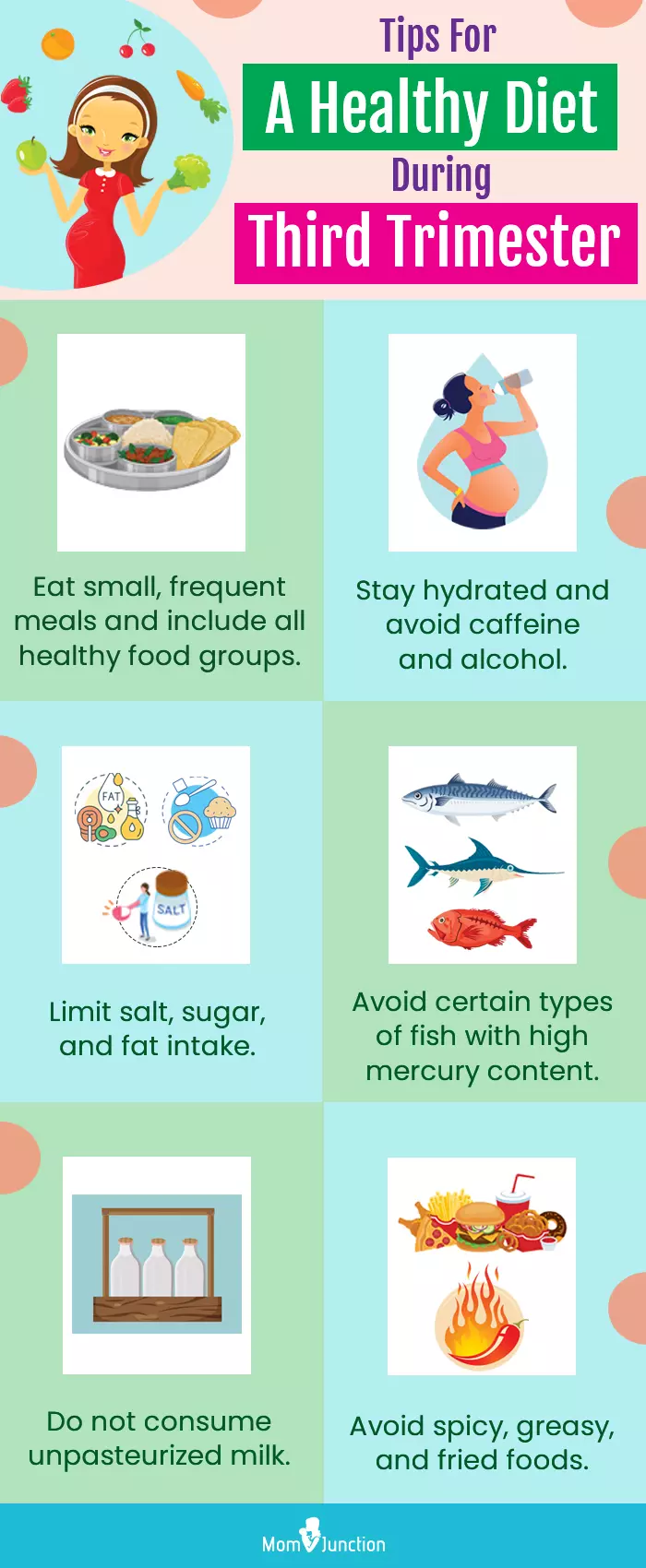
Illustration: Nutritious Foods To Include In Your Third Trimester Diet

Image: Stable Diffusion/MomJunction Design Team
Nurture your body and baby with optimal nutrition during your pregnancy journey. Learn the art of nourishment for a healthy and fulfilling pregnancy experience.
Personal Experience: Sources
MomJunction articles include first-hand experiences to provide you with better insights through real-life narratives. Here are the sources of personal accounts referenced in this article.
i. A Dietitian’s Pregnancy Food Journal;https://themasseyspot.blogspot.com/2015/04/a-dietitians-pregnancy-food-journal.html
ii. Third trimester recap + postpartum freezer stash;
https://pinchofcrazycom.wordpress.com/2020/03/21/third-trimester-recap-postpartum-freezer-stash/
References
- Healthy Weight During Pregnancy
https://www.eatright.org/health/pregnancy/prenatal-nutrition/healthy-weight-during-pregnancy#:~:text=Calorie%20Intake,calories%20a%20day%20when%20expecting. - Thomas H Bothwell; (2000); Iron requirements in pregnancy and strategies to meet them.
https://academic.oup.com/ajcn/article/72/1/257S/4729643 - Shailja Chambial et al.; (2013); Vitamin C in Disease Prevention and Cure: An Overview.
https://www.ncbi.nlm.nih.gov/pmc/articles/PMC3783921/ - Eating right during pregnancy.
https://medlineplus.gov/ency/patientinstructions/000584.htm - Thiamine.
https://lpi.oregonstate.edu/mic/vitamins/thiamin - Nuts & Seeds: Ancient Foods That Are Still Nutritional Gems Today.
https://navs-online.org/articles/nuts-seeds/ - Mark L. Dreher and Adrienne J. Davenport; (2013); Hass Avocado Composition and Potential Health Effects.
https://www.ncbi.nlm.nih.gov/pmc/articles/PMC3664913/ - Healthy food trends – Brussels sprouts.
https://medlineplus.gov/ency/patientinstructions/000725.htm - Papayas raw.
https://fdc.nal.usda.gov/fdc-app.html#/food-details/169926/nutrients - Julieanna Hever; (2016); Plant-Based Diets: A Physician’s Guide.
https://www.ncbi.nlm.nih.gov/pmc/articles/PMC4991921/ - Pregnancy and diet.
https://www.betterhealth.vic.gov.au/health/healthyliving/pregnancy-and-diet - Pregnancy: Nutrition.
https://health.clevelandclinic.org/pregnancy-diet - Nutrition During Pregnancy.
https://www.acog.org/womens-health/faqs/nutrition-during-pregnancy - Proteins And Amino Acids.
https://www.ncbi.nlm.nih.gov/books/NBK235221/ - Foods To Avoid In Pregnancy.
https://www.nhs.uk/pregnancy/keeping-well/foods-to-avoid/ - Diet During Pregnancy; American Pregnancy Association
https://americanpregnancy.org/healthy-pregnancy/pregnancy-health-wellness/diet-during-pregnancy/ - Marijke M. Faas et al.; (2009); A Brief Review on How Pregnancy and Sex Hormones Interfere with Taste and Food Intake.
https://www.ncbi.nlm.nih.gov/pmc/articles/PMC2844535/ - Benefits of Fish Oil Supplements & Fish Consumption in Pregnancy.
https://americanpregnancy.org/healthy-pregnancy/benefits-of-fish-oil-supplements-fish-consumption/ - Chessa K Lutter et al.; (2018); The potential of a simple egg to improve maternal and child nutrition.
https://pmc.ncbi.nlm.nih.gov/articles/PMC6865885/ - How to eat well in pregnancy.
https://www.tommys.org/pregnancy-information/im-pregnant/nutrition-in-pregnancy/balanced-diet-pregnancy - .Neural Tube Defects.
https://www.cdc.gov/birth-defects/about/neural-tube-defects.html
Community Experiences
Join the conversation and become a part of our nurturing community! Share your stories, experiences, and insights to connect with fellow parents.
Read full bio of Jyoti Benjamin
- Lisa Richards is a certified nutritionist coach from the Institute for Integrative Nutrition. She is an author at the Candida Diet (thecandidadiet.com), with 17 years of experience.
 Lisa Richards is a certified nutritionist coach from the Institute for Integrative Nutrition. She is an author at the Candida Diet (thecandidadiet.com), with 17 years of experience.
Lisa Richards is a certified nutritionist coach from the Institute for Integrative Nutrition. She is an author at the Candida Diet (thecandidadiet.com), with 17 years of experience. - Shena Jaramillo is a US-based registered dietitian with eight years of experience. She has completed her bachelor's degree in Nutrition Sciences from Central Washington University and master’s degree in Human Nutrition from Logan University. She specializes in eating disorders and also helps other dietitians create their businesses.
 Shena Jaramillo is a US-based registered dietitian with eight years of experience. She has completed her bachelor's degree in Nutrition Sciences from Central Washington University and master’s degree in Human Nutrition from Logan University. She specializes in eating disorders and also helps other dietitians create their businesses.
Shena Jaramillo is a US-based registered dietitian with eight years of experience. She has completed her bachelor's degree in Nutrition Sciences from Central Washington University and master’s degree in Human Nutrition from Logan University. She specializes in eating disorders and also helps other dietitians create their businesses.
Read full bio of shreeja pillai
Read full bio of Swati Patwal
Read full bio of Dr. Joyani Das










